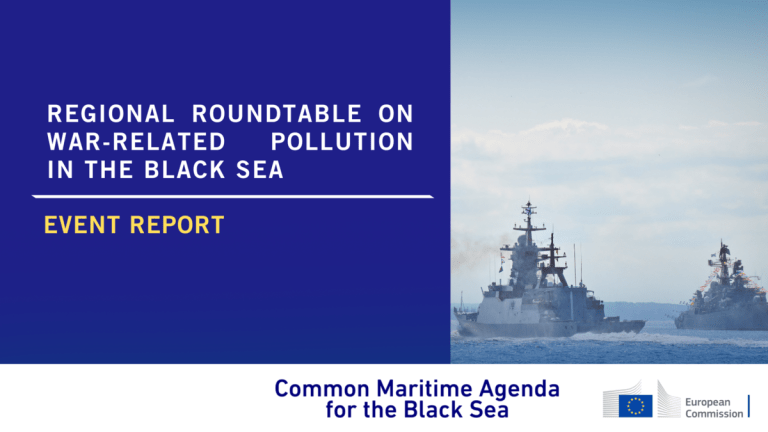On 6 June 2025, the Ukraine Coordinator of the Common Maritime Agenda (CMA) for the Black Sea, with support from the Black Sea Assistance Mechanism (BSAM) and the European Commission, hosted a regional roundtable addressing war-related pollution in the Black Sea region. Held online, the event brought together over 120 participants, including policymakers, researchers, maritime safety experts, and international organisations, reflecting broad, cross-sectoral cooperation from across the Black Sea region.
The roundtable aimed to assess the environmental and economic damage caused by Russia’s ongoing war of aggression against Ukraine, particularly its impact on the Black Sea basin. The event served as a platform to foster regional cooperation, share scientific findings, and shape strategic plans for future action under the CMA framework. Key initiatives and projects were highlighted for their contributions to maritime safety, pollution monitoring, and ecosystem restoration in secure seas. The event featured three thematic sessions:
War-related impact on navigation and shipping in the Black Sea, in which the European Maritime Safety Agency (EMSA) and the Ukrainian Sea Ports Authority (USPA) reported the findings on maritime safety observed such as extensive damage to port infrastructure and vessels, and how they are responding, providing specialised equipment and recovery strategies. The BCSEA II project was showcased for its efforts in enhancing maritime safety and environmental resilience across the Black and Caspian Seas.
Monitoring and data: UXOs, demining and war-related pollution in the Black Sea: Experts from HELCOM, the Ukraine's Centre of Demining, presented the risks posed by unexploded ordnances (UXOs) and submerged munitions, and highlighted critical efforts in developing assessments and tools are essential in mitigating such impacts on marine biodiversity and navigation safety. In addition, the UkrSCES (Ukrainian Scientific Centre of ecology of the sea) presented the integration of war-related pollution data into the Black Sea Environmental Data Platform as a key step toward evidence-based environmental management.
Environmental impact of the war on the sea basin as a common Black Sea issue session, in which key projects such as the RESPONSE and Black Sea SIERRA projects were brought to the table and revealed significant pollution from oil spills, heavy metals, and invasive species. The Institute of Marine Biology of the National Academy of Sciences (NAS) of Ukraine discussed about the destruction of critical infrastructure such as sewage systems and ports which have led to severe ecological degradation. EU4EMBLAS provided critical baseline data for assessing environmental damage and supporting legal claims for war reparations.
The roundtable concluded with a strong call for continued and strengthened international collaboration, technological innovation, and data-driven systems to address the environmental fallout of the conflict. Participants emphasised the need for enhanced monitoring and reporting, legal frameworks for environmental accountability, and post-war recovery plans that prioritise ecological restoration in the Black Sea. The event marked a significant step in uniting stakeholders around a common goal: building a greener, safer, and more resilient future for the Black Sea blue economy and its people and ecosystems.
You can read the full report of the event here.

